Degrees Are Not The Final Say

We may have the degrees, we may have the training, but it doesn’t mean that we have all the answers. In Social Justice Work, much more is required.
I once talked with someone about my experiences with intergroup dialogue; how I was introduced to it as a student in grad school, how my experiences with it helped me to expand my focus within social justice work, and how dialogue continues to influence my approach to this day.
This person had recently taken a college course on intergroup dialogue, and wasn’t a fan of the course. Although they did not go into explicit detail about the reasons why, they alluded to having issues with the ways in which the course was being facilitated, specifically by folks with identities that were privileged in relation to their own.
I was reminded from their sharing about experiences I had as a student when everyday slights and insults which reinforced dominant narratives on the idea of the inferiority of parts of my identities went unaddressed.
I was also reminded of how, even now, as a Social Worker in student affairs, some of my work also involves helping students with marginalized identities process feelings of disillusionment at the realization that their current lived experiences in the campus community environment are much different from the ones which may have been advertised.
The person’s sharing also reminded me of times when, through my work as a professor and social justice educator, my own privilege contributed to my lack of awareness of the reality of lived experiences different from my own, and the growth that I have had to go through because of that fact.
When reflecting on my time as a student, and now as a professional in the field, for current students, and fellow professionals, educators and others, I offer this simple message:
Degrees are not the final say
When thinking of the times when I’ve had my own feelings of disillusionment, and of the honest feedback from some students, expectations of a certain level of “competency” on the part of the people who are doing the educating, or working in the field play a huge role in contributing to those feelings.
A familiar scenario could go like this:
“This person has a Ph.D in Social Work, in a class on multicultural social work practice. that person is a practicing Social Worker working with this population. Why then are they doing X,Y, or Z that is harmful?” or “What happened in class today was extremely problematic.” “These are supposed to be the professionals. Why am I feeling harmed by you? This should not be happening in a school of Social Work.”
And what’s more, some students can also experience being shut down after voicing their concerns.
This is one of the challenges of “competence” and the expectation of “expert level” status being assumed in its entirety due to a person’s educational attainment.
We are not immune, or exempt.
What we as “professionals” don’t acknowledge often enough is our own implication and location in the web of power, privilege, and oppression. And when called out on something problematic that we’ve done, sometimes we can have a tendency to bury ourselves deeper in the sand by touting our credentials and using them as a means to justify our incorrectness.
When this is done, it serves to further marginalize people in the populations that we say that we would serve, and is in direct cooperation with the status quo.
Obtaining a degree in Social Work, or another helping profession should not be understood as an acknowledgement that we know all there is to know, but an acceptance of a commitment to work towards continued learning and growth, and a charge to use what we’ve learned to work with others to undo the damage that has been done.
There continues to be a need in the field that focuses on infusing the work of practicing cultural humility in Social Justice Work, which involves a commitment to lifelong learning and critical self-reflection, recognizing and challenging power imbalances for respectful partnerships, and working for institutional accountability.
It’s also important to acknowledge the people who have done, and are doing the work without the access that can come with credentials and degrees for a variety of reasons which limit their progress, and important for instructors to consider that whether they use the academically specific terms or not, marginalized students are often well-aware of the issues that impact their lives and communities long before they enter your classrooms.
The credentials are great, but it doesn’t end there.
Degrees are not the final say.
From Aspiring Humanitarian, Relando Thompkins-Jones














